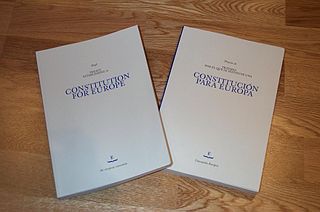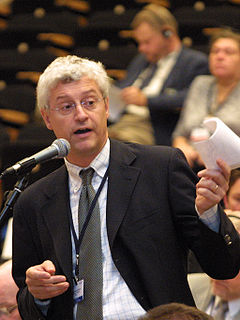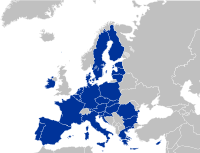
The European patent with unitary effect, more commonly known as the unitary patent, is a new type of European patent in advanced stage of adoption which would be valid in participating member states of the European Union. Unitary effect can be registered for a European patent upon grant, replacing validation of the European patent in the individual countries concerned. The unitary effect means a single renewal fee, a single ownership, a single object of property, a single court and uniform protection—which means that revocation as well as infringement proceedings are to be decided for the unitary patent as a whole rather than for each country individually. Licensing is however to remain possible for part of the unitary territory.
The European Commission (EC) is the executive branch of the European Union, responsible for proposing legislation, implementing decisions, upholding the EU treaties and managing the day-to-day business of the EU. Commissioners swear an oath at the European Court of Justice in Luxembourg City, pledging to respect the treaties and to be completely independent in carrying out their duties during their mandate. The Commissioners are proposed by the Council of the European Union, on the basis of suggestions made by the national governments, and then appointed by the European Council after the approval of the European Parliament. It is common, although not a formal requirement, that the commissioners have previously held senior political positions, such as being a member of the European Parliament or a government minister.

The Treaty establishing a Constitution for Europe was an unratified international treaty intended to create a consolidated constitution for the European Union (EU). It would have replaced the existing European Union treaties with a single text, given legal force to the Charter of Fundamental Rights, and expanded Qualified Majority Voting into policy areas which had previously been decided by unanimity among member states.

The European Anti-Fraud Office is a body mandated by the European Union (EU) with protecting the Union's financial interests. It was founded on 28 April 1999, under the European Commission Decision 1999/352. Its tasks are threefold:

The European Union Agency for Law Enforcement Cooperation, better known under the name Europol, formerly the European Police Office and Europol Drugs Unit, is the law enforcement agency of the European Union (EU) formed in 1998 to handle criminal intelligence and combat serious international organised crime and terrorism through cooperation between competent authorities of EU member states. The Agency has no executive powers, and its officials are not entitled to arrest suspects or act without prior approval from competent authorities in the member states. Seated in The Hague, it comprised 1,065 staff in 2016.

Claude Ajit Moraes is a British Labour Party politician and campaigner, who was a Member of the European Parliament (MEP) for London between 1999 and the United Kingdom's withdrawal from the EU on 31 January 2020. He was Chair of the Civil Liberties, Justice and Home Affairs Committee, Deputy Leader of the European Parliamentary Labour Party and Vice-President of the Socialists and Democrats Group in the European Parliament.

Eurojust is an agency of the European Union (EU) dealing with judicial co-operation in criminal matters among agencies of the member states. It is seated in The Hague, Netherlands. Established in 2002, it was created to improve handling of serious cross-border and organised crime by stimulating investigative and prosecutorial co-ordination.

Although there has been a large degree of integration between European Union member states, foreign relations is still a largely intergovernmental matter, with the 27 members controlling their own relations to a large degree. However, with the Union holding more weight as a single bloc, there are at times attempts to speak with one voice, notably on trade and energy matters. The High Representative of the Union for Foreign Affairs and Security Policy personifies this role.

The European Arrest Warrant (EAW) is an arrest warrant valid throughout all member states of the European Union (EU). Once issued, it requires another member state to arrest and transfer a criminal suspect or sentenced person to the issuing state so that the person can be put on trial or complete a detention period.

A continental union is a regional organization which facilitates pan-continental integration. Continental unions vary from collaborative intergovernmental organizations, to supranational politico-economic unions. Continental unions are a relatively new type of political entity in the history of human government. Throughout most of human history, political organization has been at the local level and in more recent centuries, the sub-regional ("regional")/sub-continental level ; however, starting with the advent of better transportation, weapons and communication there was for the first time the ability for a union of member states to organize at the continental level. After the devastation of the First and Second World Wars in the middle of the twentieth century, Europe began to slowly integrate with the founding of the "European Community", which became a political union covering much of the European continent.

The Prüm Convention is a law enforcement treaty which was signed on 27 May 2005 by Austria, Belgium, France, Germany, Luxembourg, the Netherlands and Spain in the town of Prüm in Germany, and which is open to all members of the European Union, 14 of which are currently parties.

The National Anticorruption Directorate, formerly National Anticorruption Prosecution Office, is the Romanian agency tasked with preventing, investigating and prosecuting corruption-related offenses that caused a material damage to the Romanian state. The institution deals with the fight against high corruption offences, which have caused damage greater than €200,000 or if the object of the crime is property or sums of money amounting to over €10,000.

The European Union (EU) consists of 27 member states. Each member state is party to the founding treaties of the union and thereby shares in the privileges and obligations of membership. Unlike members of other international organisations, the member states of the EU have agreed by treaty to shared sovereignty through the institutions of the European Union in some aspects of government. Member states must agree unanimously for the EU to adopt some policies; for others, collective decision making is by qualified majority voting. Subsidiarity, meaning that decisions are taken collectively if and only if they cannot realistically be taken individually, is a founding principle of the EU.

The history of the European Union between 1993 and 2004 was the period between its creation and the 2004 enlargement. The European Union was created at the dawn of the post–Cold War era and saw a series of successive treaties laying the ground for the euro, foreign policy and future enlargement. Three new member states joined the previous twelve in this period and the European Economic Area extended the reach of the EU's markets to three more.

In the European Union (EU), enhanced cooperation is a procedure where a minimum of nine EU member states are allowed to establish advanced integration or cooperation in an area within EU structures but without the other members being involved. As of October 2017, this procedure is being used in the fields of divorce law, patents, property regimes of international couples, and European Public Prosecutor and is approved for the field of a financial transaction tax.

The area of freedom, security and justice (AFSJ) is a collection of home affairs and justice policies designed to ensure security, rights and free movement within the European Union (EU). Areas covered include the harmonisation of private international law, extradition arrangements between member states, policies on internal and external border controls, common travel visa, immigration and asylum policies and police and judicial cooperation.
The Mechanism for Cooperation and Verification (CVM) is a safeguard measure invoked by the European Commission when a new member or acceding state of the European Union has failed to implement commitments undertaken in the context of the accession negotiations in the fields of the Area of freedom, security and justice or internal market policy.

Giovanni Kessler is an Italian prosecutor. He was until 2017 the Director-General of the European Anti-Fraud Office (OLAF). OLAF is a department of the European Commission, but it is independent in its investigative function. Based in Brussels, OLAF is tasked with protecting the financial interests of the European Union by investigating fraud, corruption and any other illegal activities. It also investigates serious matters relating to the discharge of professional duties by members and staff of the EU institutions and it supports the EU institutions, in particular the European Commission, in the development and implementation of anti-fraud legislation and policies.

The Treaties of the European Union are a set of international treaties between the European Union (EU) member states which sets out the EU's constitutional basis. They establish the various EU institutions together with their remit, procedures and objectives. The EU can only act within the competences granted to it through these treaties and amendment to the treaties requires the agreement and ratification of every single signatory.

“Victor Negrescu” is a Romanian politician of the Social Democratic Party. He is a Member of European Parliament and he was Minister Delegate for European Affairs in the government of Romania between 2017 and 2018. Since 2007, he is the president and national coordinator of the Romanian network of PES activists.






















